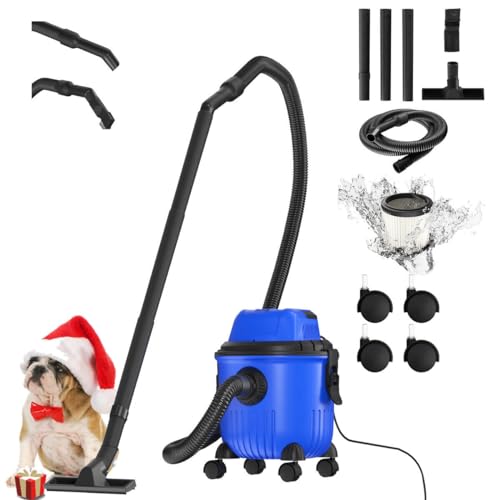Introduction to Industrial Vacuum Cleaners: Why They Matter
Understanding the Importance of Industrial Vacuum Cleaners
Industrial vacuum cleaners are essential tools for maintaining cleanliness in various settings, including factories, warehouses, and construction sites. They play a crucial role in ensuring safety and hygiene by efficiently removing dust, debris, and hazardous materials. When we think about large-scale operations, the volume of waste and pollutants generated can be significant. Industrial vacuum cleaners not only help streamline clean-up processes but also support compliance with health and safety regulations, ultimately contributing to a healthier working environment.
Key Features to Consider: What Makes a Good Industrial Vacuum Cleaner
Power and Suction Capability
When selecting an industrial vacuum cleaner, one of the most important features to look for is its power and suction capability. A powerful motor translates into stronger suction, which means more efficient cleaning. For instance, if you are regularly dealing with heavy debris or wet materials, you’ll need a vacuum that can handle these challenges without losing performance.
Filtration System
The filtration system is another key consideration. Industrial vacs come equipped with different types of filters, such as HEPA filters, which trap microscopic particles. If your workspace involves dust or allergens, investing in a vacuum with a high-efficiency filtration system can greatly reduce airborne contaminants, making the environment safer for everyone.
Capacity and Size
Capacity matters as well; larger bins mean longer periods of operation without needing to empty them. Depending on the size of your workspace, a vacuum with a generous capacity will allow you to clean more area before stopping for maintenance. Additionally, the size and weight of the vacuum can affect mobility, so it’s worth considering models that are easy to manoeuvre, especially in tight spaces.
Durability and Construction Materials
The construction of the vacuum can impact its longevity and effectiveness. Choosing a model made from durable materials can withstand heavy use and harsh conditions. For example, if your industrial application involves corrosive substances, look for vacuums designed specifically to resist wear and tear.
Types of Industrial Vacuum Cleaners: Finding the Right Fit for Your Needs
Wet and Dry Vacuum Cleaners
Wet and dry vacuum cleaners are versatile options that can handle both liquid and solid waste. They are particularly useful in environments where spills are common or where different types of debris must be managed together. For example, in a construction site, a wet and dry vacuum can quickly address water from a recent rain along with sawdust, ensuring that everything is cleared efficiently.
Central Vacuum Systems
Central vacuum systems offer a different approach by installing a permanent cleaning system within a facility. These are particularly beneficial for larger operations where mobility can be an issue, allowing users to connect hoses and clean various areas without moving the main unit. This can save time and effort during extensive cleaning tasks.
Explosion-Proof Vacuum Cleaners
For industries dealing with flammable dust or volatile materials, explosion-proof vacuum cleaners are necessary. These units are specifically designed with safety features to prevent ignition and ensure that cleaning operations can proceed without risk, which is vital for maintaining safety standards in hazardous environments.
Maintenance Tips for Longevity: Keeping Your Industrial Vacuum in Top Shape
Regular Filter Checks and Cleaning
Maintenance is key to ensuring that your industrial vacuum lasts longer and operates efficiently. Regular checks of the filters help maintain suction power while ensuring that the vacuum is doing its job effectively. Over time, filters can become clogged, reducing efficiency; thus, a diligent cleaning or replacement schedule is advisable.
Inspecting and Replacing Hoses and Attachments
Another aspect to consider is the condition of hoses and attachments. Inspections before and after use can help identify any wear or damage. Replacing worn parts promptly helps avoid further damage to the machine and ensures peak performance.
Routine Maintenance Servicing
Lastly, routine servicing by a professional can be beneficial. This includes lubricating moving parts and checking electronic components. By investing in regular maintenance, we can prevent breakdowns and extend the lifespan of the machine, making it a more economical choice in the long run.
Final Thoughts: Making an Informed Purchase Decision
Assessing Your Needs
As we consider making an informed purchase, it’s crucial to assess your specific needs first. Evaluate the size of your space, types of debris encountered, and how frequently the vacuum will be used. This will help narrow down choices tailored to your situation.
Budget Considerations
Investing in a quality industrial vacuum cleaner is a financial commitment. However, it’s important to view this as an investment rather than a mere expense. Pricing can vary significantly, so taking the time to compare models that fit within your budget while meeting your operational needs is worth it.
Future-Proofing Your Purchase
Lastly, consider future-proofing your purchase. Opt for a model that not only fits your current requirements but can also adapt to any expansion of your operations down the line. This foresight can save you from needing to purchase additional vacuums prematurely, ensuring your investment serves you well for years to come.


















